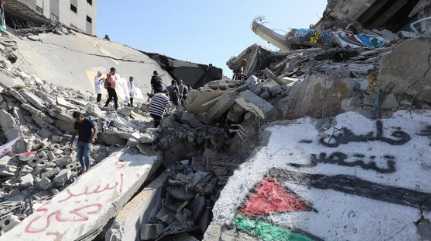
19 October 2023; AA: As the ongoing Israel-Palestine conflict enters its 13th day having claimed the lives of over 5,000 people, an Israeli academic says it is unlikely Tel Aviv will be held accountable for allegedly using disproportionate force in Gaza.
Neve Gordon, who is professor of international law and human rights at Queen Mary University of London, asserts that the International Criminal Court (ICC) tends to target weaker entities rather than powerful nations, like Israel, raising critical questions about the efficacy of international legal avenues in this conflict.
“If we look at the ICC and who has been brought forth to the ICC, we also see that it is mostly a court that tries the weak rather than the strong,” says Gordon in a video interview to Anadolu.
International law was created by state parties and is often used to defend strong state parties against weaker non-state parties, he says.
By international law, Gordon means the laws of war; the four Geneva Conventions of 1949 and the Additional Protocols of 1977.
He believes that international law will not be the savior of the Palestinian people as it has a lot of exceptions and leaves a lot of room to interpretation and manipulation.
According to him, Israel has in the past used international law to defend itself in the face of accusations of illegitimate violence.
While it is not a signatory to the ICC’s establishing 1998 treaty, it can still be taken to the court.
Gordon explained that the investigation can proceed due to Palestine’s 2015 accession to the Rome, which gave the ICC jurisdiction over crimes perpetrated by Palestinian nationals or crimes perpetrated in whole or in part on Palestinian territory.
War crimes
On war crimes committed during the latest escalation in the Israeli-Palestinian conflict, the academic said Tel Aviv’s response to a surprise attack by Gaza-based Palestinian group Hamas has been “riddled with war crimes.”
These includes it cutting off of electricity and water supply to the Gaza strip, as well as the demand that 1.1 million people leave their homes in a very short time frame.
“Definitely, the bombing of civilian sites indiscriminately can be considered (a war crime), he added.
Gordon predicts that it is highly likely Israel will commit more war crimes if it follows through with a ground assault it is planning on Gaza.
He says Hamas’ Oct. 7 on Israel was “definitely a war crime because Hamas attacked mainly civilians.”
Strong countries cannot be held accountable
According to the Israeli professor, it is “very difficult” to hold strong countries accountable for their actions.
“We see Israel occupying the Palestinians for years on end and it's not accountable to its actions. So, I don't think the law is going to be the tool.”
“I think it has to be that civil society in different countries pressure their governments and say to their governments, ‘this is not ok.’ You have to stop the escalation of violence and bring justice to Israel-Palestine.”
Gordon also believes that the pro-Palestinian campaign for Boycott, Divestment and Sanctions (BDS) against Israel is the most effective way to bring Tel Aviv to account.
Manipulating laws
On Israel’s manipulation of international laws to get away with war crimes, Gordon gives the example of Israel ordering over 1 million people to evacuate northern parts of the Gaza Strip and head to its south.
If Israel launches a ground attack, it will say they told civilians to leave, according to Gordon.
This will lead to it assuming that anyone that has not left is likely involved in the fighting and therefore a legitimate target.
Gordon said that though “thousands of civilians will likely stay in the area,” Israel will treat these civilians as participants in the hostilities or as “human shields.”
“That is a way of legitimizing actually the targeting of protected people. So, by casting people that are protected according to international law as if they are human shields just because they remained in their home is a way of manipulating the laws of war.”
Support for cease-fire
The international law professor says he definitely supports a cease-fire, de-escalation of violence, and an immediate exchange of hostages and prisoners inside Israel.
He said a protracted situation of colonial violence is being used against the Palestinians.
On a two-state solution, he feels such an outcome is “history,” and that there was no longer any way to go back to it.
“So, what we actually have now between the Jordan River and the Mediterranean Sea is one state. it's an apartheid state. And what we need to do is figure out mechanisms to basically democratize the state that currently exists so that both Jews and Palestinians will have equal votes and can live as equal citizens and in one country.”




